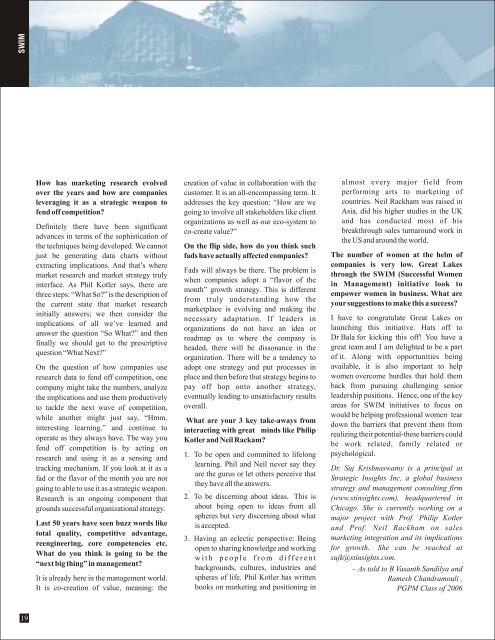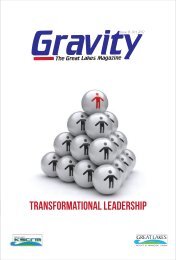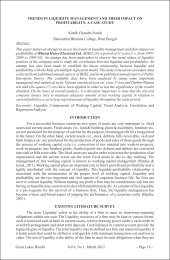Gravity Magazine_Final - Great Lakes
Gravity Magazine_Final - Great Lakes
Gravity Magazine_Final - Great Lakes
Create successful ePaper yourself
Turn your PDF publications into a flip-book with our unique Google optimized e-Paper software.
SWIM<br />
19<br />
How has marketing research evolved<br />
over the years and how are companies<br />
leveraging it as a strategic weapon to<br />
fend off competition?<br />
Definitely there have been significant<br />
advances in terms of the sophistication of<br />
the techniques being developed. We cannot<br />
just be generating data charts without<br />
extracting implications. And that’s where<br />
market research and market strategy truly<br />
interface. As Phil Kotler says, there are<br />
three steps: “What So?” is the description of<br />
the current state that market research<br />
initially answers; we then consider the<br />
implications of all we’ve learned and<br />
answer the question “So What?” and then<br />
finally we should get to the prescriptive<br />
question “What Next?”<br />
On the question of how companies use<br />
research data to fend off competition, one<br />
company might take the numbers, analyze<br />
the implications and use them productively<br />
to tackle the next wave of competition,<br />
while another might just say, “Hmm,<br />
interesting learning,” and continue to<br />
operate as they always have. The way you<br />
fend off competition is by acting on<br />
research and using it as a sensing and<br />
tracking mechanism. If you look at it as a<br />
fad or the flavor of the month you are not<br />
going to able to use it as a strategic weapon.<br />
Research is an ongoing component that<br />
grounds successful organizational strategy.<br />
Last 50 years have seen buzz words like<br />
total quality, competitive advantage,<br />
reengineering, core competencies etc.<br />
What do you think is going to be the<br />
“next big thing” in management?<br />
It is already here in the management world.<br />
It is co-creation of value, meaning: the<br />
creation of value in collaboration with the<br />
customer. It is an all-encompassing term. It<br />
addresses the key question: “How are we<br />
going to involve all stakeholders like client<br />
organizations as well as our eco-system to<br />
co-create value?”<br />
On the flip side, how do you think such<br />
fads have actually affected companies?<br />
Fads will always be there. The problem is<br />
when companies adopt a “flavor of the<br />
month” growth strategy. This is different<br />
from truly understanding how the<br />
marketplace is evolving and making the<br />
necessary adaptation. If leaders in<br />
organizations do not have an idea or<br />
roadmap as to where the company is<br />
headed, there will be dissonance in the<br />
organization. There will be a tendency to<br />
adopt one strategy and put processes in<br />
place and then before that strategy begins to<br />
pay off hop onto another strategy,<br />
eventually leading to unsatisfactory results<br />
overall.<br />
What are your 3 key take-aways from<br />
interacting with great minds like Philip<br />
Kotler and Neil Rackam?<br />
1. To be open and committed to lifelong<br />
learning. Phil and Neil never say they<br />
are the gurus or let others perceive that<br />
they have all the answers.<br />
2. To be discerning about ideas. This is<br />
about being open to ideas from all<br />
spheres but very discerning about what<br />
is accepted.<br />
3. Having an eclectic perspective: Being<br />
open to sharing knowledge and working<br />
with people from different<br />
backgrounds, cultures, industries and<br />
spheres of life. Phil Kotler has written<br />
books on marketing and positioning in<br />
almost every major field from<br />
performing arts to marketing of<br />
countries. Neil Rackham was raised in<br />
Asia, did his higher studies in the UK<br />
and has conducted most of his<br />
breakthrough sales turnaround work in<br />
the US and around the world.<br />
The number of women at the helm of<br />
companies is very low. <strong>Great</strong> <strong>Lakes</strong><br />
through the SWIM (Successful Women<br />
in Management) initiative look to<br />
empower women in business. What are<br />
your suggestions to make this a success?<br />
I have to congratulate <strong>Great</strong> <strong>Lakes</strong> on<br />
launching this initiative. Hats off to<br />
Dr Bala for kicking this off! You have a<br />
great team and I am delighted to be a part<br />
of it. Along with opportunities being<br />
available, it is also important to help<br />
women overcome hurdles that hold them<br />
back from pursuing challenging senior<br />
leadership positions. Hence, one of the key<br />
areas for SWIM initiatives to focus on<br />
would be helping professional women tear<br />
down the barriers that prevent them from<br />
realizing their potential-these barriers could<br />
be work related, family related or<br />
psychological.<br />
Dr. Suj Krishnaswamy is a principal at<br />
Strategic Insights Inc, a global business<br />
strategy and management consulting firm<br />
(www.stinsights.com), headquartered in<br />
Chicago. She is currently working on a<br />
major project with Prof. Philip Kotler<br />
and Prof. Neil Rackham on sales<br />
marketing integration and its implications<br />
for growth. She can be reached at<br />
sujk@stinsights.com.<br />
– As told to B Vasanth Sandilya and<br />
Ramesh Chandramouli ,<br />
PGPM Class of 2006
















